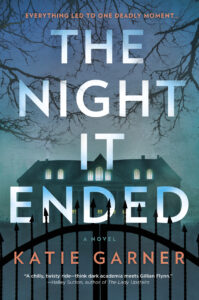Tropes. Whether you’re new to the genre or can spot a red-herring 300 pages away, there’s at least one trope you love. Like magnets, we’re drawn to the tropes we know we enjoy. We yearn to fall in love with how an author skillfully surprises us even when using the oldest, well-worn trope.
No matter which tropes you favor—and there are hundreds—these 4 have stood the test of time. They’re found in works by Agatha Christie and Patricia Highsmith all the way to modern greats such as Sarah Pinsborough and Lisa Jewell. What is it about tropes? What makes them so delectable? So despised? So comforting?
Let’s do a brief deep dive into these 4 popular tropes—the four ‘legs’ of the trope table. Maybe we can solve the mystery behind why writers keep writing them—and why readers keep reading them. Because one thing is for certain: these tropes are here to stay.
ONE:
THE ISOLATION TROPE
Even the most unseasoned amongst us are familiar with the isolation trope. A cabin. A cave. A chalet. Mansions, manors. Islands and…planes! Every location humans have stepped foot in has been used to isolate our favorite main characters from safety, help, and even information.
Take for instance Taylor Adam’s newest chiller, The Last Word. Our heroine desires solitude after a life-altering incident. And so the story begins with her housesitting on a beach in the middle of nowhere. One neighbor very far away? Check. Limited communications? Check. No one knows where she is? Check. It’s a setup so perfect I can weep.
Besides, who hasn’t wished to be on a solo-adventure or peaceful vacation somewhere? Who hasn’t dreamed of an isolated, quiet retreat on a secluded private island? The very concept taps into basic human desires. I mean, I don’t know about you, but I’ve been dying to be invited to a creepy family reunion on a ‘tiny tidal island’ á la Daisy Darker by Alice Feeney. Just kidding…or was I? Which brings us to number two—
TWO:
THE UNRELIABLE NARRATOR TROPE
One could argue the unreliable narrator trope is the OG of mystery tropes. Allegedly invented by Agatha Christie in The Murder of Roger Ackroyd in 1926, the unreliable narrator uses reader’s innate trustworthiness in the author to shepherd them into twist-ville.
Sure, readers may expect a character to be secret sociopath—but which one? And why? Who’s telling the truth? Who isn’t? Is the main character who they say they are? Or are they pretending, as seen in The Talented Mr. Ripley by Patricia Highsmith? Is our narrator unreliable because they are a criminal? Are they a secret villain? A savior in disguise? Without a doubt, the unreliable narrator is hiding something. A sordid secret. A dark past. Both.
The fun rests with solving the character. The mystery lies inside the character and the character is the mystery. As Gillian Flynn wrote in Gone Girl, “What are you thinking? How are you feeling? Who are you?” Readers enjoy sneaking a peek inside the mind of someone unreliable. We crave discovering what’s really hiding in someone else’s head…but what do we do if even the character doesn’t know? Which brings us to number three—
THREE:
THE AMNESIA TROPE
Love it or hate it, the amnesia trope is a true classic. It’s something so simple and so complicated at the same time. Amnesia can be combined with number two—the unreliable narrator. Is the character really struggling with amnesia? Are they telling the truth? Or do they really remember everything? Are they choosing not to remember? It can be absolutely delectable.
Exhibit A: The Bourne trilogy by Robert Ludlum. Solidly in the thriller genre and still going strong—#18 in the series, The Bourne Defiance by Brian Freeman, releases in 2023—is proof this trope isn’t going away anytime soon. Amnesia itself appeals to readers for several reasons: amnēsia, the greek word for ‘forgetfulness,’ is something humans fear. What if we wake up and don’t remember our own name? Our family? What exactly happened last night?
Characters suffering amnesia have a clean slate with readers: they literally have no history, memories, secrets, or fears. The thrill comes from learning these things along the way, right beside our main character. Fictional amnesiacs would benefit from letters, diary entries, or even videos to aid with their memory loss…which brings us to number four—
FOUR:
THE EPISTOLARY TROPE
Arguably a form of novel, the epistolary trope encompasses an array of literary devices cropping up (thankfully!) in many new releases. Letters, journal entries, and redacted audio transcripts—as seen in my debut psychological thriller The Night It Ended—all fall under the umbrella of epistolary. In fact the very definition of the word epistolary means ‘message’ or ‘letter,’ derived from the Greek word: epistolē.
The Writing Retreat by Julia Bartz springs to mind when imaging a book-within-a-book. And The Night Film by Marisha Pessl skillfully weaves websites, transcripts, and more into the pages, bolstering its fictional world as reality. But where did this literary device originate from? Love Letters Between a Nobleman and His Sister, written in 1684, was the first novel composed entirely of letters. The trope has advanced a lot since then, and readers can’t get enough of it.
Perhaps it’s the capacity for variety that’s so intriguing. Or is it the mystery that goes with it—can we trust this diary? Can I believe what I’m reading is real? Verity by Colleen Hoover may be the most popular epistolary novel at the moment, and with good reason. Hoover brilliantly utilized the epistolary trope, giving readers one of the most mind-blowing twists of 2018 (some would argue of the decade)—and it’s paid off big time. The book has sold over 2 million copies with no signs of slowing down.
Readers can’t get enough of the ‘normal’ turned ‘abnormal,’ the what-ifs, the I do that every day, I can’t believe that happened. Whether it’s waking up and forgetting the night before, as seen with the amnesia trope, writing in your diary and wondering if it will one day be used in a police investigation, as seen with the epistolary trope, or going on vacation and being trapped with a killer as seen with the isolation trope, we love reading how the things we do every day can become something more.
Any trope can fall flat, for any reason and for any reader. It really is subjective. But for right now, I’m happy to say these tropes are here to stay.
***


















